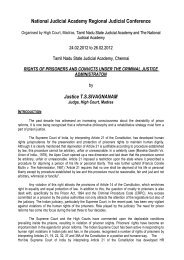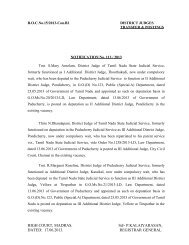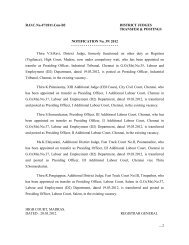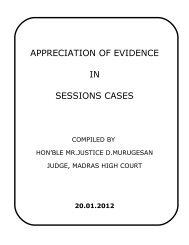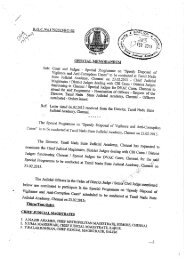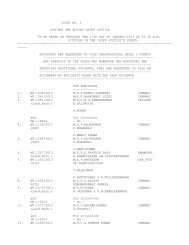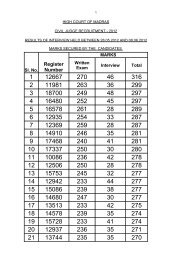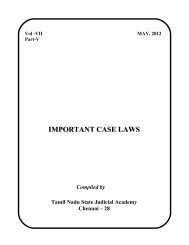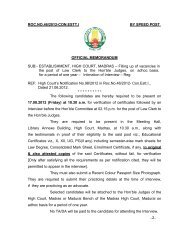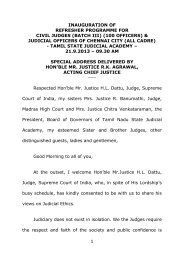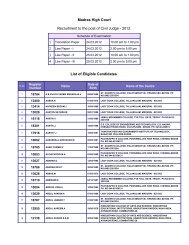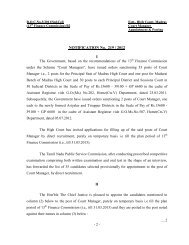IMPORTANT CASE LAWS - Madras High Court
IMPORTANT CASE LAWS - Madras High Court
IMPORTANT CASE LAWS - Madras High Court
Create successful ePaper yourself
Turn your PDF publications into a flip-book with our unique Google optimized e-Paper software.
(2011) 3 MLJ 21<br />
M.V. Jayavelu<br />
vs<br />
E. Umapathy<br />
Code of Civil Procedure (5 of 1908), Order 7 Rule 11 – Rejection of plaint – Suit for specific performance –<br />
Plaint does not disclose any cause of action for filing suit for specific performance – Plaint liable to be rejected.<br />
Held:<br />
When the plaint proceeded on the basis that there was an agreement of sale dated 19.4.2000 and the plaintiff is<br />
entitled to specific performance of the contract, in the absence of proof of any such agreement of sale dated 19.4.2000, it<br />
can be held that the plaint has not disclosed any cause of action.<br />
The plaintiff has not produced any document to prove that there was an agreement of sale between the parties.<br />
Further, the alternative prayer is also clearly barred by limitation as admittedly the amount was paid in the year 2000 and in<br />
the year 2008, the same cannot be recovered. It may be that the plaintiff is entitled to be in possession of the property till<br />
the defendants refund the amount but that is not a ground to maintain the present suit filed by the plaintiff. Therefore,<br />
according to the <strong>Court</strong>, the plaint does not disclose any cause of action for filing a suit for specific performance and the claim<br />
for refund of 2,000/- is also barred by limitation. Hence, the plaint is liable to be rejected.<br />
2011 (3) CTC 31<br />
Aravindharaj Adhithan<br />
vs<br />
R. Perumal<br />
Transfer of Property Act, 1882 (4 of 1882), Section 106 – Termination of Tenancy – Termination Notice<br />
issued to vacate premises within 10 days – Suit filed long after statutory period of 15 days – Even if Notice was<br />
treated as defective, it got cured by filing of Suit after 15 days statutory period – Concurrent finding as to eviction,<br />
upheld.<br />
Facts:<br />
Land issued notice terminating tenancy. Notice was issued granting 10 days for vacating premises. Landlord filed<br />
Suit after the statutory period of 15 days. Tenant contended that the notice was defective. Trial <strong>Court</strong> as well as Appellate<br />
<strong>Court</strong> ordered eviction as against which Tenant preferred Second Appeal. The Hon’ble <strong>High</strong> <strong>Court</strong> concurred with the<br />
findings and dismissed the Second Appeal with following observation.<br />
Held:<br />
The learned Counsel for the Respondent/Plaintiff, at this juncture, appropriately and appositely, correctly and<br />
convincingly would place reliance on the amended Section 106 of the Transfer of Property Act and submit that even though<br />
in the termination notice only 10 days’ time was granted for the Defendant to vacate the premises, in fact, the Suit was filed<br />
long after the statutory period of 15 days, so to say, the notice was admittedly received on 3.2.2006 and the Plaint was<br />
presented only on 21.2.2006 and in such a case, only after a lapse of statutory 15 days’ time as contemplated under Section<br />
106 of the Transfer of Property Act, the Suit was instituted and even if the notice was treated as a defective one, it got cured<br />
by virtue of the Suit itself having been filed after 15 days as contemplated under Section 106 of the T.P. Act.<br />
13



